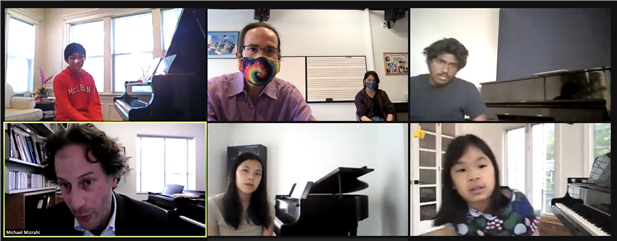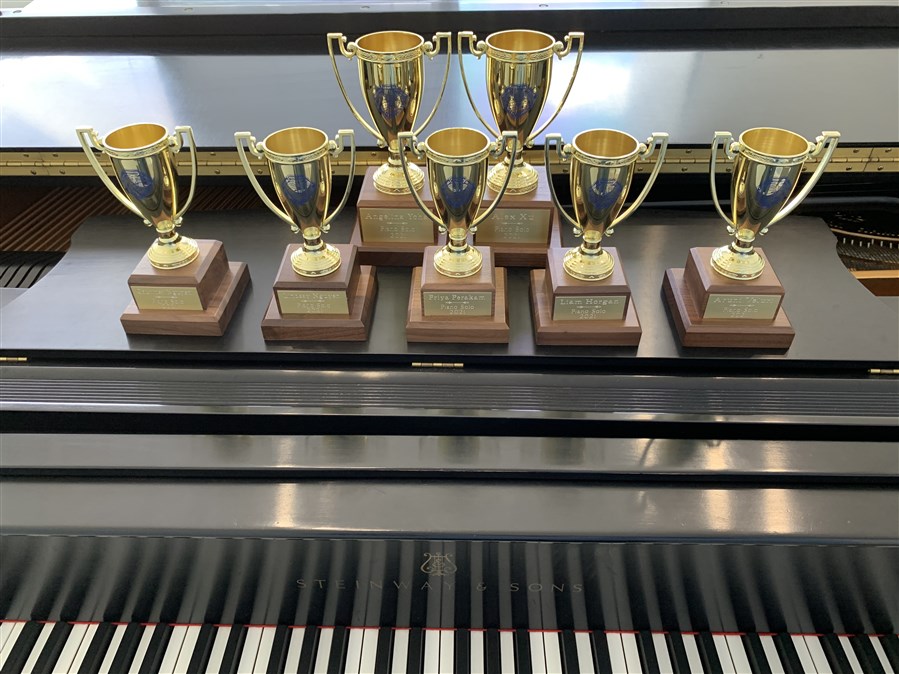Memorial Day Weekend 2021
Thursday, May 27, 2021 | News
We will be closed for the Memorial Day Weekend break from Friday May 28 through and including Monday May 31. We re-open on our usual school-year schedule on Tuesday June 1. The old school-year schedule continues through and including Sunday June 20.
Student Honors: NVMTA Achievement Awards 2021
Friday, May 21, 2021 | Student Awards and Honors
Each year in May, Northern Virginia Music Teachers Association sponsors a competition they call Achievement Awards. It's a chance for the region's most high-achieving and dedicated youth students to compete for prizes and to receive expert commentary. This year's event was held using pre-recorded videos due to the coronavirus situation. We were lucky to have several students interested to step up and prepare for this demanding event. Congratulations to Philip Wang, who was selected for Honorable Mention. His program: Prelude and Fugue in c minor, WTC 1 (J.S. Bach); Sonata in D Major Hob. 37 (F.J. Haydn); Jazz Prelude No. 4 (Nikolai Kapustin).
Student Honors: Studio Master Class May 2021
Thursday, May 20, 2021 | Student Awards and Honors
 Our second remote master class was held on Sunday May 16. Before 2020, all master classes were conducted in-person. But since it was not possible to meet in person this time, we were not limited to local pianists! We were delighted to welcome a fabulous guest artist who joined us remotely from Wisconsin! Michael Mizrahi of Lawrence University shared his expert perspective and fresh insights with five experienced and prepared students. Congratulations to those who stepped up and performed and learned in this challenging environment! Katrina Nelson (Wilmington Waltz, B. Johnson) ♪ Ai-Lan Pho (Impromptu in E-flat Major, F. Schubert) ♪ Varun Veluri (Prelude No. 3, G. Gershwin) ♪ Hannah Wang (Invention in C Major, J.S. Bach) ♪ Alex Xu (Liebestraum No. 3, F. Liszt)
Our second remote master class was held on Sunday May 16. Before 2020, all master classes were conducted in-person. But since it was not possible to meet in person this time, we were not limited to local pianists! We were delighted to welcome a fabulous guest artist who joined us remotely from Wisconsin! Michael Mizrahi of Lawrence University shared his expert perspective and fresh insights with five experienced and prepared students. Congratulations to those who stepped up and performed and learned in this challenging environment! Katrina Nelson (Wilmington Waltz, B. Johnson) ♪ Ai-Lan Pho (Impromptu in E-flat Major, F. Schubert) ♪ Varun Veluri (Prelude No. 3, G. Gershwin) ♪ Hannah Wang (Invention in C Major, J.S. Bach) ♪ Alex Xu (Liebestraum No. 3, F. Liszt)
Student Honors: Bach Baroque 2021
Wednesday, May 19, 2021 | Student Awards and Honors
Bach/Baroque Festival, an annual event sponsored by Northern Virginia Music Teachers Association, was held in remote format this year, due to the coronavirus situation. Participating students prepared and recorded performances of two different Baroque-era (1600-1750) pieces, from memory. Congratulations to Elena Valdez-Torres, who received the top rating of Superior. Receiving both the top rating of Superior and also the additional competitive award of Honors were Owen Rollins, Anne Severino, Varun Veluri, and Philip Wang.
Student Honors: NFMC Festival 2021
Thursday, May 13, 2021 | Student Awards and Honors
 On March 12 & 13, 2021, many of our students participated in NFMC Spring Festival, hosted locally by Springfield Music Club. Due to the coronavirus situation, this year's festival was conducted via Zoom, which allowed every participating student to present a live (not pre-recorded) performance. Congratulations to the following students who earned the top score of Superior:
On March 12 & 13, 2021, many of our students participated in NFMC Spring Festival, hosted locally by Springfield Music Club. Due to the coronavirus situation, this year's festival was conducted via Zoom, which allowed every participating student to present a live (not pre-recorded) performance. Congratulations to the following students who earned the top score of Superior:
Sebastian Annett, Alexa Garcia, Sarah Hellman, Noa Herzog, Valentina Hong, Helena Horowitz, Maya Lang, Vihaan Mathur, Caeli McIntosh, Keshavan Nair, Katrina Nelson, Kaitlin Nguyen, Gizem Onerci, Erin Pak, Ryan Qi, Eliana Rougle, Pelin Sarac, Karthik Thyagarajan, Elena Valdez-Torres, Abigail Wang, Hannah Wang, Philip Wang, Ethan Williams
In addition to earning the top score of Superior, the following students also received gold cups! These cups are awarded based on a point system. It takes a minimum of three years to earn your first cup.
Liam Horgan, Courtney Nguyen, Lindsay Nguyen, Priya Perakam, Aruni Veluri, Alex Xu (solo AND concerto!), Angelina Yoha, Varun Veluri (solo AND concerto!)
For Best Results...Foundations for Successful Piano Students
Wednesday, May 5, 2021 | Practicing and General Education
WE TEACH ALL AGES AND ALL STAGES We want all our students to love music. And we know that most students won’t grow up to be concert artists. Just the same, our fundamental goal is that each student experiences growth—month over month, year over year. And that, over time, this leads to substantial and durable skill at the instrument. With many years of experience, we know that the following foundations are necessary for student success. For best results…
PRACTICE INSTRUMENT Invest in the best-quality practice instrument you can, as soon as you can. An acoustic piano is strongly recommended for all ages and levels. A digital keyboard with full-sized, fully-weighted keys is acceptable for beginners. Anything less than full-sized fully-weighted keys is a toy, for our purposes. A bridge to buy you a few weeks to find a more suitable instrument, perhaps. Nothing more. You can invest in lessons…but without a quality acoustic piano, you’ll always be working against an invisible headwind. You’ll never explore your potential.
PRACTICE CONSISTENCY People with healthy teeth brush their teeth every day, or at least most days! Successful younger students practice every day. Daily practice is useful for all ages and levels, but the younger the student, the more vital it is to the student’s progress.
PRACTICE QUANTITY It’s not uncommon for a dedicated youth gymnast to spend nine hours per week in the gym. Even a recreational youth soccer player spends about three hours per week in season. Effective practice takes time. You don’t want to be watching the seconds tick by as you practice, listlessly waiting for your timer to buzz: “practice is over!” That won’t work! But without a lot of repetitions and a lot of time, you won’t progress in your skill. Week by week, you’ll need at least three hours of at-home practice in addition to your lesson. Spread over the week, that’s about 30 minutes per day. Youngest beginners may work up to this over the course of a few months. Consistency counts more than time for the youngest. But for everyone else: with less time, you’ll make little, if any, progress. With more time, you’ll make more progress. 30 minutes is just a ballpark to help you identify the line between adequate and inadequate for elementary-level students. It’s not enough to reach more advanced skill levels. Advanced students commonly require six to nine hours per week of at-home practice to continue to progress in skill.
PARENT SUPPORT Young children learn music the way they learn language: in the home and in the world, alongside their parents and caregivers. When a young child (ages 4 to 8) enrolls in piano lessons, it’s a journey that the parent and child take together. Attending lessons together and practicing together each day with a spirit of joint exploration are essential. For slightly older students (ages 8 to 12) parent engagement, assistance, and supervision can greatly increase the efficacy of the student’s practice. Even for older students (ages 10 to 12 and older), parent engagement and attention can still be useful. While all students will someday need to practice and learn independently, the process of acquiring this independence takes many years of support.
RECITALS Some students are natural performers and others are reluctant. Either way, when you have an event to prepare for, you’re more likely to do better work. When you can celebrate the achievement of your successful performance, you build your confidence and you make it more likely that you will look forward to, and be motivated by, future performance opportunities. Without the first recital, there is no second recital!
WORKSHOP CLASSES Some of us are introverts and some of us are extroverts. But even introverts need a peer group! Could you imagine going to school all alone with only one tutor and no other students? Our workshop classes are the heart of our community. They are a place to gain exposure, experience, confidence in sharing your music with others and will help you feel comfortable playing in recitals and other higher-intensity events. Workshops also let you set small benchmarks and goals. They give you access to new teacher perspectives and personalities. They are a place to make friends and learn from your peers.
EVENTS Performance events include non-competitive festivals, competitive events, as well as performance exams. In our Studio, no particular event is required of our students. But gaining independent feedback from expert evaluators and sharing music in the wider community are both invaluable for progressing students. Those who participate in outside events are more likely to stick with lessons and more likely to experience growth in their skill.
VARIETY Students enjoy lessons more and gain more durable skill when they study and enjoy different types of music. This means variety in all forms: style, genre, time period, technical exercise, and difficulty.
SUMMER PROGRAMS Few parents would encourage their child to go the whole summer without reading! Likewise with music. Learning is a year-round activity! That doesn’t always mean taking piano lessons every week. But keeping active with music-making, practice, and music-listening are essential to your long-term success. We offer a flexible Summer Session which allows our students to attend lessons when it is possible and convenient with no minimum commitments or fixed tuition.
THE CHICKEN OR THE EGG How do I know that my child will stick with lessons? Simply: no one knows for sure. Your child might stick with lessons, or she might not. Personality, lifestyle, aptitude, student interest, the student-teacher relationship…each plays a role. All are beyond the scope of this article. But the foundations on this list are vital. Which comes first? The talented student who plays with beautiful expression, or the student with a quality practice instrument? The happy and dedicated student, or the student with a consistent practice routine? We’ve seen many students with high aptitude or apparently strong potential who quickly loose interest and quit. We’ve seen students of moderate aptitude achieve tremendous skill at the piano.
FEELING OVERWHELMED? In this short article, we’ve described the foundations that are necessary for a specific type of success—which we define as month to month, year to year growth which one day results in substantial and durable skill at the piano. And we have started with a big assumption: that the student already has an interest in learning to play and that they show this interest through their demeanor at lessons and their attention to at-home practice. If you’re feeling overwhelmed: start by thinking about your goals are for your lessons and what is practical for your family. Do not allow the perfect to be the enemy of the good. Each day of your practice is like one step on a thousand-mile journey. You want that journey to lead somewhere, but you also want to enjoy the trip! Good luck and best musical wishes!

